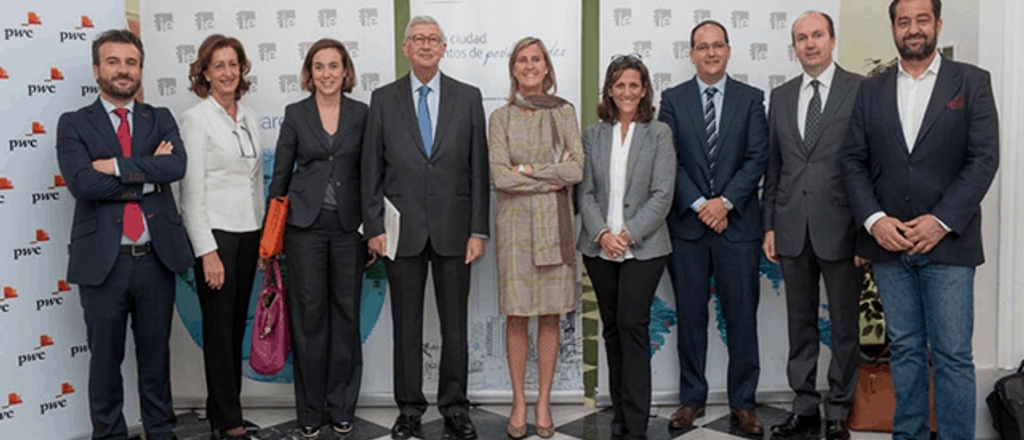- Home
- News And Events
- What’s Going On
- Spain At The Forefront Of "smart Cities" In Europe
Spain at the forefront of "Smart Cities" in Europe

The fact that Spain is at the forefront of smart cities worldwide is the main message drawn from the report, which points to cities like Santander, Burgos, Valencia, Caceres, Badajoz, Coruña, Málaga, and Barcelona as being among the more groundbreaking examples.
Another key finding of the report, based on more than 1,200 interviews with Spanish citizens and 40 experts, is that the fields of healthcare, environment, and education are what citizens care about most, while security is another priority. In terms of aspects that affect citizens day-to-day lives, those they rate the lowest are the local economy, mobility and traffic, and, in last place, local government, which is the field where citizens consider there is most room for improvement in terms of satisfaction.
The ongoing urbanization process means that 60% of Spain’s population will live in cities by 2020, compared to the current figure of 50%. Moreover, the digital revolutions is creating a hyperconnected society, and experts forecast that by 2020 there will be 50 billion connected devices. Participating experts describe a smart city as being “one that uses technology to provide urban sources in the most efficient manner possible, to improve citizens’ quality of life, and to transform relations among local entities, companies, and citizens, affording a new style of city living.
The term is now familiar for most people, as 8 out of 10 citizens recognize the concept, even if they see it as being in the very early stages. Only two out of ten consider their city smart, or very smart.
Spain’s citizens consider that administration, mainly local administration, should be leading this transformation. They also believe, however, that citizens themselves, and companies – particularly those in sectors like telecommunications, energy and technology, should play a major role in the process. Telefónica is seen by as by far the main agent in providing support for the transformation of cities, coupled with firms in the energy and technology sectors.
Gildo Seisdedos, IE Business School professor and coordinator of the study, explained how the application of technology in cities offers enormous potential when it comes to improving citizens’ quality of life, and how we are only just beginning to see the first of many ways it can do this. “The challenge,” he says, “is to go beyond current experiences and convert them into realities that have a big impact on public administration and citizens’ standard of living.”
Marieta Del Rivero, adjunct general director of Telefónica’s digital trade area talked about how the digital transformation of cities is a great opportunity to foster economic, social and cultural development that would make Spain stand out in Europe, a process in which citizens would be the protagonists. “What citizens want is to be part of a collaborative economy. We have to ensure that cities are equipped to let that happen.”
The roadmap for smart cities
Participating experts concurred that there were six key areas when it comes to accelerating the digitalization of a city:
1. Leadership and organizational change. The mayor must assume full leadership of the process, driving the kind of cultural change that transforms vertical organizations into transversal businesses. The mayor should also facilitate synergies among the different organizations that are responsible for municipal services, implementing a strategic plan for the city to guarantee that objectives and results are monitored.
2. City plan. This should be prepared using long-term vision that is shared and agreed on by all agents. Said plan should not change every time there is a new legislature.
3. Legal framework. Contracting systems have to evolve and be updated to make models more flexible. It is the only way to ensure that the right technology is in place.
4. Open source technology model, which has open data and can used across all platforms. Now is the time to set the rules of the game and avoid building closed systems subject to appropriation. There is still no specific standard in the Internet of Things and the platforms should be made to share information and talk with each other. It is the only way to use data to build an economy. Furthermore, citizens demand more transparency and open data portals are an excellent example of how a city can make information available in a transparent manner.
5. Funding. Public-private sector collaboration speeds up the transformation of services and brings specific two-way competences and knowledge. The National Smart City Plan is a good example of how to contribute to this objective.
6. Sustainable business models. Every day we generate 2.5 trillion bytes of date, according to experts. The digitalization of cities is going to make those numbers grow and the big challenge will be to leverage that information in order to build sustainable business models. Such models would take consumer interests into account. For example, if waste containers had sensors, we would have access to personalized information on what they are used for, and waste management tax could be levied on an individual basis.